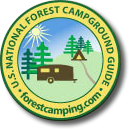Don’t be a headline this winter
Headline from last winter: Family in their recreational vehicle rescued from Oregon’s snow-covered wilderness

There are lessons to be learned.
Lesson 1 – Check the weather forecast. Storms can surprise even the most experienced. A weather radio is essential to any traveler. I remember enjoying a delightful stay at Gooseberry Lake Campground in Fishlake National Forest. One morning Fred remarked it “feels it snow” by lunch the sky was “lowering.” We followed Fred “gut feeling” and got off the mountain (we were at 7800 feet) and wouldn’t you know we woke the next morning to see that mountain snow capped and Gooseberry Campground snowed in.
Lesson 2 – Have an idea of the topography and roads you are traveling. Mountains and forest service roads rarely have enough room for a turn-around that can accommodate a large motorhome. And if the weather turns yucky, maneuvering a big RV on roads that are native soil can be tricky. Not to many years ago, we take a wrong turn around sunset and ended up on at a dead end on Forest Service road that was, maybe, one-and-half lanes wide. It took us at least 30-minutes of maneuvering to turn our 31-foot motorhome around.
Lesson 3 – Always having extra supplies, just in case. This stranded family in the headline claimed to have enough supplies for more than two weeks. I always have some dehydrated and dried food stuff tucked away somewhere. It’s light, compact, and relatively tasty. Canned goods are heavy and bulky but we carry a few items for emergencies. In my opinion, potable, or safe” water would be my greatest challenge but a have a good quality water filtering system and purification pills so I’m good.
Lesson 4 – Always following the adage: preparation is 85% of success. Or in other words, hope for the best but prepare for the worst.
Lesson 5 – Make sure someone knows your itinerary, when you are going, in general, where you’ll be, and how long will you be gone.


